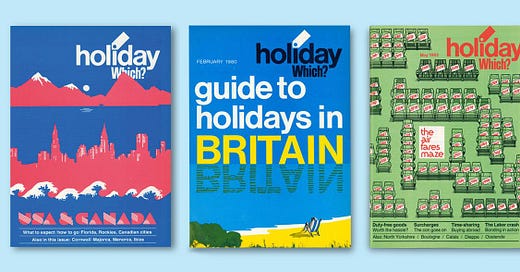So which travel pubs pay expenses? | Interview: Which? Travel turns 50
Find out how it all began at Which? Travel — and how they work with freelancers now
This email finishes off our series on paying your own way. We’ve explored how other writers make it work, but how does an entire magazine do it? As British travel magazine Which? Travel turns 50 this month, we've interviewed editor Rory Boland about how it began, where they are now, and how they work with freelancers.
Which? Travel is 50 years old. But where did it all begin?
The early seventies was when holidays abroad became affordable for tens of millions of people, but there was little or no information at the time about where they were going — no Google, of course, but in most cases no guidebook either. Instead they relied on the brochure, which often resembled a work of fiction when you found your ‘seaside hotel’ was in the middle of nowhere, and that the town had no roads or telephones and no one spoke English. It could be quite frightening.
So in 1974, a small team of journalists at Which? set up Holiday Which? to provide ‘information holidaymakers could trust’. In their own words they wanted to apply the same in depth and rigorous research Which? was famous for so readers could choose a holiday destination and provider with confidence.
The first magazine had destination reports on Rhodes, Corfu and the Algarve, where staff were sent on inspections to hundreds of hotels to check everything from whether there was really running water and lifts to whether the pedalos were in working order.
Campaigning journalism was fundamental from the start. It’s difficult to imagine now but health and safety on holidays was a big problem in the 70s and 80s. Holidaymakers often faced food and water poisoning, while deaths from carbon monoxide or drowning at pools were too common. The magazine would regularly dispatch environmental health inspectors and heating engineers abroad to highlight the issue and pressure authorities to act. It fought bitterly, and successfully, for improvements to regulations and laws after several disasters.




